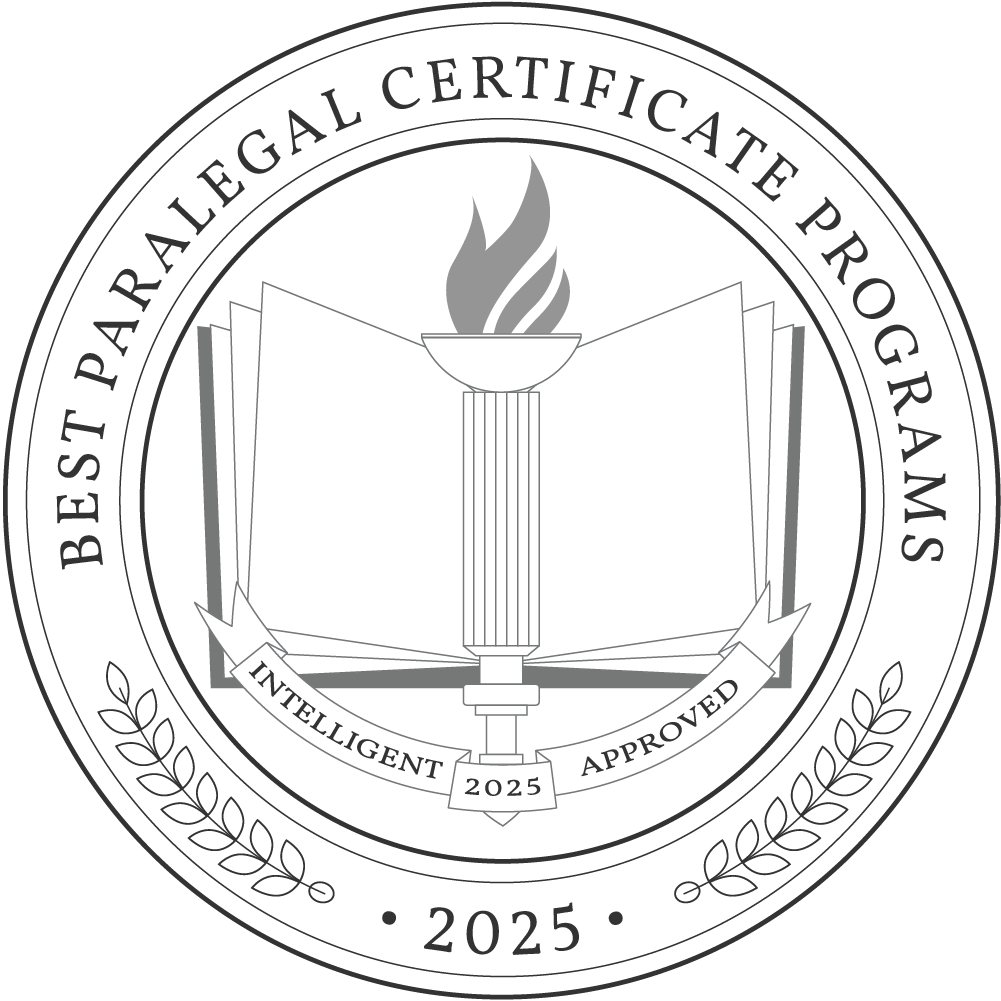Paralegals perform essential functions for law firms, such as conducting research, preparing for trials, and composing reports. A paralegal certificate provides the necessary training for individuals to take on this important and in-demand role.
According to the Bureau of Labor Statistics (BLS), the legal field is projected to experience faster-than-average growth over the next decade. For paralegals and legal assistants, this means 38,000 new job openings per year, on average, through 2032. Paralegals earn a median annual wage of $59,200. With further education and experience, those with paralegal backgrounds can go on to work as lawyers, arbitrators, or mediators.
There’s no standard number of credits for a paralegal certificate program, so completion time varies. The programs included on this list range from 18 to 56 total credits. Cost varies as well, with per-credit tuition for our selected programs ranging from $123 to $1,310 per credit hour.
Why Trust Us
The Intelligent.com Higher Education Team is dedicated to providing students with independent, equitable school and program rankings and well-researched resources. Our expert-driven articles cover topics related to online colleges and programs, paying for school, and career outlooks. We use data from the U.S. Department of Education’s College Scorecard, the National Center for Education Statistics, and other reputable educational and professional organizations. Our academic advisory team reviews content and verifies accuracy throughout the year for the most current information. Partnerships do not influence rankings or editorial decisions.
- Analyzed over 2,000 national, accredited, and nonprofit colleges and universities
- 800+ rankings pages are reviewed and updated yearly
- Content is informed by reputable sources, surveys, and interviews with academic advisors and other experts
- Over 100 data points are reviewed for accuracy and quality throughout the year, including sources
How we rank schools
Our list features the best Paralegal Certificate degree programs at top colleges nationwide. Each school featured is a nonprofit, accredited institution — either public or private — with a high standard of academic quality for post-secondary institutions.
We evaluated each school’s program on tuition costs, admission, retention and graduation rates, faculty, reputation, and the student resources provided for online students. We collected data from trusted sources like the National Center for Education Statistics, individual school and program websites, school admissions counselors, and other data sources. Then, we calculated the Intelligent Score on a scale of 0 to 100 based on the following criterion:
Academic Quality:
- Admission rate versus enrollment rate
- Retention rate of students who return after year one
- Accreditation status (regional and programmatic)
- Nonprofit status, both private and public institutions
Graduation Rate
- Overall graduation rate
- Total number of currently enrolled students, including diversity metrics
- Student-to-faculty ratio
Cost and ROI
- In-state and out-of-state per-credit tuition rates and fees
- Required credits to graduate
- Earning potential after graduation
- Availability of federal student loans, scholarships, and other financial aid options
Student Resources
- Available student services for online-only and hybrid programs
- On-campus amenities like tutoring centers and the number of libraries
Read more about our ranking methodology.
Best 5 Accredited Paralegal Certificate Programs
FiltersInstitution Type
Status
- Intelligent Score
- Alphabetically By University Name
- Acceptance Rate
- Enrollment
- In-state Graduate Tuition
- Out-of-state Graduate Tuition
- In-state Undergraduate Tuition
- Out-of-state Undergraduate Tuition

Tacoma Community College
Intelligent Score: 99.72In-state: $25,850
Out-of-state: $31,598
In-state: NA
Out-of-state: NA
SAT: 470 or higher
ACT: 19 or higher
Resident: $123
Non-Resident: $140 - $317
On-Campus
Northwest Commission on Colleges and Universities
56

Villanova University
Intelligent Score: 98.97In-state: $56,730
Out-of-state: $56,730
In-state: $20,619
Out-of-state: $20,619
SAT: 1320-1460
ACT: 30-33
$575
On-Campus, Online
Middle States Association Commission on Higher Education
15 courses

GW College of Professional Studies
Intelligent Score: 96.19In-state: $55,961
Out-of-state: $55,961
In-state: $31,770
Out-of-state: $31,770
SAT: 1270-1450
ACT: 30-33
$1,310
On-Campus, Online
Middle States Commission on Higher Education
18

Loyola University Chicago
Intelligent Score: 94.55In-state: $67,818
Out-of-state: $67,818
In-state: $97,480
Out-of-state: $97,480
SAT: 1190-1370
ACT: 27-32
$790
On-Campus, Online
Higher Learning Commission
22

Middlesex College
Intelligent Score: 92.03In-state: $19,944
Out-of-state: $22,488
In-state: NA
Out-of-state: NA
SAT: NA
ACT: NA
Resident: $124
Non-Resident: $232
On-Campus, Online, Hybrid
Middle States Commission on Higher Education
31
How to Choose a Paralegal Certificate Program
Choose your area of study
Before you begin researching paralegal certificate programs, think about what your ultimate career and educational goals are. For example, if your ultimate goal is to become a lawyer, you have a few options. Earning a paralegal certificate and working as a paralegal can be an ideal way to gain experience in the legal field before pursuing a law degree. However, students can progress directly from an undergraduate degree program into law school, which may be a better option for some students.
Also, consider what you’ll need in terms of program logistics. Can you attend a program that meets during regular business hours, or will an evening or weekend program better meet your needs? Will you enroll on a full-time or part-time basis? Considering these factors early on will help you weed out programs that don’t suit your needs.
Research schools and programs
Paralegal certificate programs are plentiful, so give yourself adequate time to explore your options. Start by visiting programs’ websites to find basic information about curriculum, faculty, admission requirements, tuition, and financial aid. If you have more specific questions, contact the school’s admissions office or attend a virtual or in-person information session, where you can ask direct questions to program representatives.
Some information that you should collect when considering programs includes:
- What the program’s curriculum includes, and how it aligns with your interests and goals
- What specialization options are available
- Names and qualifications of faculty
- When classes are offered and if they fit into your schedule
- Any experiential learning components, such as internships
- Admission requirements
- Tuition, fees, and financial aid
- School and program accreditation status
Confirm that any schools you’re considering are regionally accredited by a recognized accrediting body, as a school’s accreditation status can impact future employment and educational opportunities. The American Bar Association (ABA) also approves paralegal education programs that meet industry standards for legal education.
Prepare for applications
Enrollment processes for certificate programs tend to be less rigorous than full degree programs. Some certificate programs only require an enrollment form, registration deposit, and transcripts from previously attended schools to get started. Others require students to submit an application, transcripts, letters of recommendation, resume, and personal statement.
For the most accurate information about how to apply to a paralegal certificate program, visit the school’s website or speak to an admissions counselor. Verify start dates and admissions deadlines. Some programs enroll new students multiple times throughout the year, while others only have one or two enrollment dates. Missing application deadlines can delay your entry into the program.
Select your program
Compare the information you’ve gathered about various paralegal certificate programs and determine which one best fits your needs and preferences. If several programs are appealing, you can apply to all of them and decide based on where you are accepted. Some things to consider when selecting a program include cost and available financial aid, curriculum, faculty areas of expertise, and completion time.
Determine how you’ll pay for your certificate
As part of your research, you should collect information about how much programs cost and what forms of financial aid are available for students in certificate programs. Not all certificate programs are eligible for financial assistance through the Federal Student Aid program, which includes federal student loans and grants. If you plan on using this type of financial aid to pay for your certificate program, confirm that your selected program is eligible. Financial aid counselors can provide the most accurate information about a program’s cost and financial aid eligibility.
To obtain federal student aid, you must submit the Free Application for Federal Student Aid (FAFSA), which schools use to determine eligibility for need-based aid like federal student loans, grants, scholarships, and more. Other sources of financial support include private education loans, scholarships, and employer tuition assistance benefits.
What Can You Expect From a Paralegal Certificate Program?
Paralegals perform a variety of tasks related to the practice of law, including preparing legal documents, conducting research, and managing cases. While paralegals may not need the depth of law knowledge that a licensed attorney has, they must be familiar with different types of law, legal language and writing, and law office operations.
The curriculum of paralegal certificate programs covers these areas with classes focusing on common types of legal practice, such as contract law, criminal law, real estate law, and personal injury law. Students will also have classes to develop their essential paralegal skills, including writing, research, ethics, and office coordination.
The number of credits required for a paralegal certificate varies by school. Some programs require as few as 18 credits, while others require up to 56. Students who enroll in longer programs will receive more robust preparation, although those in shorter programs will be ready to join the workforce sooner.
Potential courses you’ll take in a paralegal certificate program
- Introduction to Paralegal Studies: Most programs include an introductory course that covers the function and sources of American law (including the U.S. Constitution), the American legal system, the civil litigation process, and the role of the paralegal.
- Legal Research and Writing: Introduces students to the methods, tools, and rules of print and online legal resources, as well as how to draft, edit, and present legal documents based on their research. Students gain familiarity with tools like online databases and the Bluebook and learn how to write memorandums, motions, and briefs.
- Legal Ethics: Reviews ethical codes for attorneys and paralegals and ethical considerations in the practice of law that paralegals are likely to encounter, especially the unauthorized practice of law, client confidentiality, and conflicts of interest.
- Litigation: Provides the essential professional skills that support litigation. Students explore topics such as the Federal Rules of Civil Procedure, criminal procedure, juvenile procedure, and administrative procedure.
- Law Office Computer Applications: A technical course covering software programs commonly used in law offices as well as word processing, spreadsheets, PDF management, and presentation graphics.
Paralegal Certificate Program Frequently Asked Questions
How do I apply to a paralegal certificate program?
For guidelines for applying to a specific paralegal certificate program, refer to the school’s website or speak to an admissions counselor, as application procedures vary by institution.
Some schools don’t have a full application process for certificate programs, allowing students to enroll directly by submitting a registration fee and providing transcripts from previously attended institutions. Others require a complete application, including transcripts, letters of recommendation, personal statement, resume, and SAT or ACT scores.
The most common way for students to apply to post-secondary programs is via an admissions portal on the school’s website, but confirm a school’s protocols before beginning your application.
How much does a paralegal certificate program cost?
The cost of a paralegal certificate varies by program. Most certificate programs charge tuition on a per-credit basis. For programs on this list, the per-credit tuition fee ranges from $123 for an in-state student at a public college to $1,310 at a private school. Because tuition is assessed on a per-credit basis, the overall number of required credits also impacts the cost of the program.
Students should also factor in any scholarships, grants, or employer tuition assistance benefits they may receive to help cover tuition costs.
For the most accurate information about how much a paralegal certificate will cost, speak to a financial aid counselor at your prospective schools.
How long does it take to earn a paralegal certificate?
The length of a paralegal certificate program depends on how many credits the program requires and the pace at which a student moves through the program. The programs on this list range from 18 to 56 credits and can take anywhere from four months to two years. Students who enroll in classes full-time will finish their coursework faster than those who attend part-time. Consult with an admissions counselor or program representative from a school to get more specific information about completion time.

